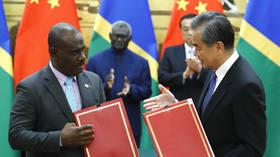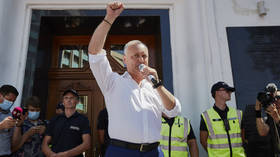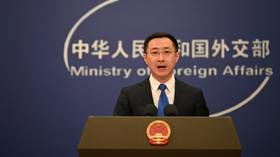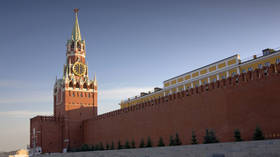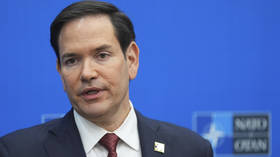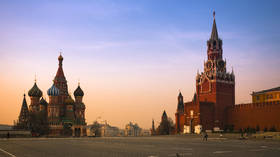Liz Truss's militant rhetoric is another sign that post-Brexit Britain is dangerously delusional

A fanatical neoconservative, British Foreign Secretary Liz Truss presents world affairs in an uncompromising ideological struggle between "democracy" and "authoritarianism."
She also seems to be addicted to the fervor of the Cold War.
Her address on Wednesday night in London bordered on showing desire for war against Russia and China simultaneously. By first calling to "push Russia out of the whole of Ukraine," Truss described the conflict as "our war," then proceeded to turn to China and taunt Beijing that its rise "was not inevitable," demanding that they "play by the rules" and even arguing that NATO should defend Taiwan in a potential contingency. Truss once again called for a "a network of liberty" and urged avoiding economic dependencies on undesirable countries (again a reference to Russia and China).
But, unfortunately for Truss and despite the climate we now exist in, none of this huffed-up rhetoric has any serious basis in reality. Yet, if she gets her way, the potential dangers are existential: The British Foreign Secretary’s rhetoric is spoiling for direct conflict not just against one but two nuclear superpower adversaries. To try and oust Russia from Crimea and to prevent China from taking Taiwan, if it moves to do so, are both scenarios which could result in a military response, potentially even a nuclear one. This doesn't seem to faze Truss, and European leaders will probably not be happy with this, even if her masters in Washington will be delighted to hear it. However, it ultimately speaks to a wider truth that the hubris and nostalgic vigor of Brexit is driving Britain off a cliff edge, deposing its foreign policy of any kind of reason, restraint, moderation or realism about its current place in the world.
The story of Britain's foreign policy since 1945 might be summarized as that of a declining Empire going through stages of grief. If the Suez Crisis represented anger and denial, then Britain's bid to join the European Economic Community in the 1970s represented bargaining and acceptance. Yet, it didn't last. Britain's Anglophone exceptionalist identity, compounded of course by the geographic conditioning of separation from mainland Europe, produced a very different historical experience from that of its neighbors. While France and Germany have recent memories of widespread devastation from centuries of wars, Britain, unscathed and undefeated, sees its history as that of triumph and lacks the pragmatism of its counterparts.
As a result, the British Empire faded away as opposed to facing a 'reckoning' of sorts, meaning British public opinion was never 'reset' and continues to believe it was a force for good, allowing the political right to continue to iconize it. It is precisely this nostalgia for imperialism that has manifested itself in the form of Brexit amongst many in the Conservative Party. Given in reality that Brexit itself has brought no economic benefits whatsoever, the Johnson government has sought to compensate for this by doubling down on nationalistic rhetoric and the euphoria of "Britannia rules the waves". The slogan of "Global Britain" is essentially a code word for Empire, the connotation of a country aloof from the internal squabbling of European politics that instead pursues ambitious trade ventures all over the world and seeks to militarily dominate all in the name of moral and ideological exceptionalism.
It should be no surprise that this rhetoric is getting worse as the UK economic environment deteriorates. Inflation is at a 30-year high, energy prices are out of control, Covid-19 has scuppered the economy and, worse still, Boris's own government is deeply unpopular after being rocked by an ever-recurring series of scandals, and is looking for whatever distractions it can muster. Against this backdrop, and with the conflict in Ukraine, is it really surprising that Liz Truss is being allowed to thunderously call for Cold War and, potentially, even a hot one? This is not a manifestation of Britain's strength, as dangerous as these comments may be, but a display of Britain's weaknesses. The current government has nothing else going for it than to appeal to nationalist and Imperialist sentiment by entertaining the possibility of war with other great powers and invoking the historically offensive Opium-wars-style rhetoric against China. But reality of course is different. Truss won't admit it, but the UK needs China as a critical post-Brexit economic partner, and of course we all know there is no chance Russia will be driven out of Ukraine. It seems implausible that despite her position and given not even Boris himself is so staunchly anti-China, that she has the actual influence to singlehandedly achieve her vision.
So, while this rhetoric may be dangerous, it's also empty talk at best from an increasingly unpopular government that wants to create as much noise as possible before the local elections, but that isn't stopping Truss from doing as much damage as possible to Britain's standing in the world as she can in her own aspirations for leadership first. Yet the fact the foreign secretary has been reduced to this kind of talk is emblematic of the broader problems Britain is facing, a country whose identity and aspirations are chronically out of touch with reality. It is no longer a projection of triumph, but one of woe.
The statements, views and opinions expressed in this column are solely those of the author and do not necessarily represent those of RT.
